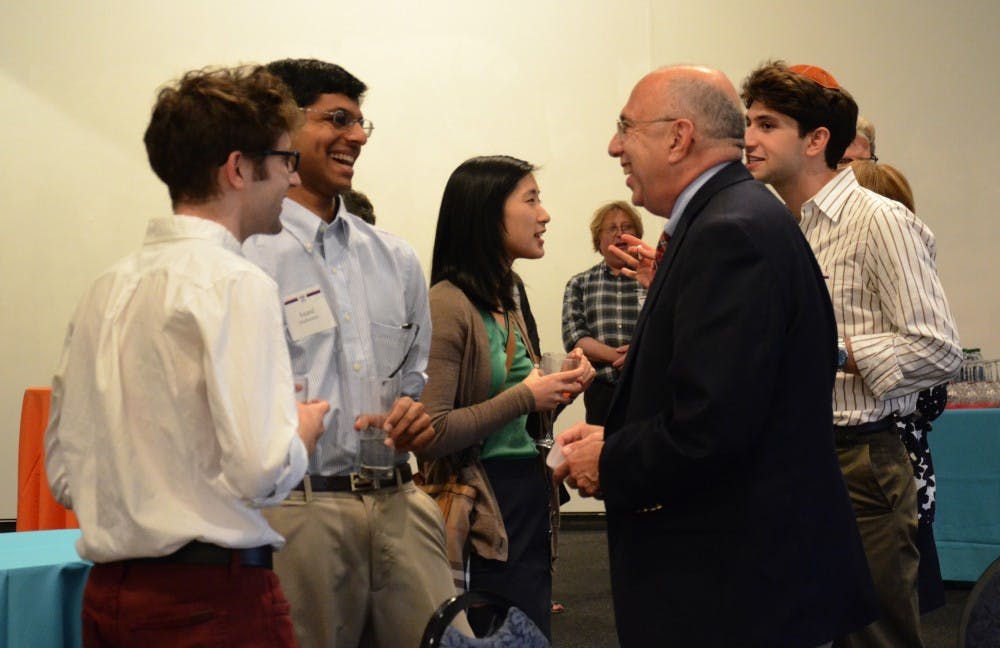Wednesday evening, Penn began a new chapter of its two-year reaccreditation process, with the Provost’s Office hosting a gathering to officially kick off the University’s self-study.
As part of its reaccreditation application to the Middle States Commission on Higher Education, Penn is currently conducting an internal review of undergraduate education. During the process — which takes place once every 10 years — the University will identify key priorities in undergraduate education and assess how effectively programs are achieving their goals.
The self-study process, chaired by Vice Provost for Education Andrew Binns, will solicit the opinions of administrators, faculty members and students.
Penn’s last self-study — which was conducted as part of the 2003-04 reaccreditation application — focused on graduate students and brought about changes like the establishment of the Graduate Student Center on Locust Walk.
As part of this year’s process, seven working groups, each centered around different topics, will submit reports to a steering committee by the end of the academic year. The seven reports will then be reviewed by the committee and compiled into a single document, which will be sent to different groups like the University Council and the Board of Trustees.
The final report will be submitted to the evaluation team at MSCHE by December 2013.
Many of the working group topics — such as “Integrating Knowledge,” “Access and Equity,” “Global Engagement” and “Local Engagement” — stem from tenets of the Penn Compact, which University President Amy Gutmann launched at her inauguration. This reaccreditation review will be the first since Gutmann came to Penn.
“The expectations for the self-study is that it be mission-driven,” Executive Director for Education and Academic Planning in the Provost’s Office Rob Nelson said. “The Compact, as the president’s vision for what’s important for the University, definitely informs the self-study.”
Nelson said that while there is little doubt that Penn will be reaccredited, the self-study is an opportunity to bring together different opinions across campus on Penn’s mission and goals. According to Nelson, this reaccreditation will have the highest level of student involvement to date.
“We designed this whole process to put students right in the middle. Often, what happens is that there will be a student representative or two,” he said. “We wanted to create more comprehensive way of engaging students in this process.”
A student representative will serve on six of the seven working groups. In addition to the student representatives, the steering committee will include 16 students to provide input on the process. Eight of these students are members of the Student Committee on Undergraduate Education and the other eight were appointed by the Undergraduate Assembly.
“By bringing in people who are not only focused on the academic side of Penn, but on the whole undergraduate life at Penn … we could address and lay a plan to improve [the problems] in this process,” said College and Wharton junior Abe Sutton, the UA’s vice president. “It’s really a self-examination of the whole University.”
Sutton is the only elected member of the UA who will be serving on the steering committee. The other seven students appointed by the UA are leaders from different organizations on campus.
College junior and Lambda Alliance Chair Hugh Hamilton, said he was impressed by the level of student involvement in the process.
“They’re being very mindful that students bring a unique perspective and they’re doing everything they can to incorporate us,” he said. “We’re offering a service to the school in providing our perspective and giving an accurate picture of the school.”
SCUE, the third leg of the triangle in the reaccreditation process, will be heavily involved on the academic side of undergraduate education. Wharton senior and SCUE Chair Scott Dzialo said Penn’s reaccreditation is directly relevant to students.
“We’re all hugely invested in the University because the University has been investing in us,” he said. “The decisions that will come out of this self-study will forever change the future of Penn, in big and small ways.”



